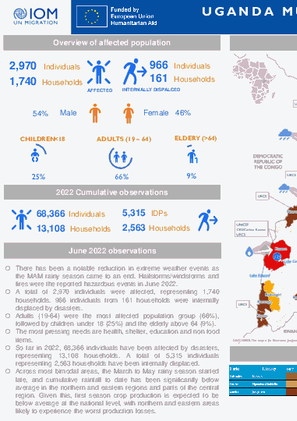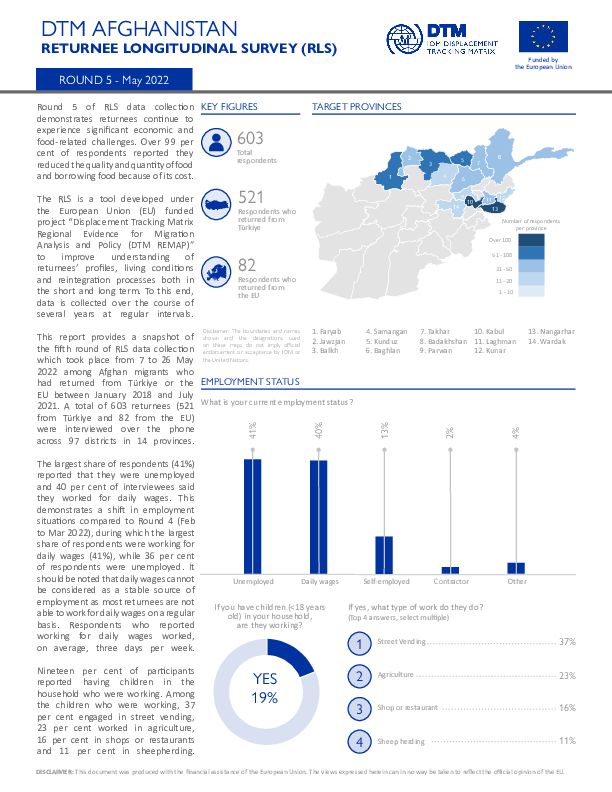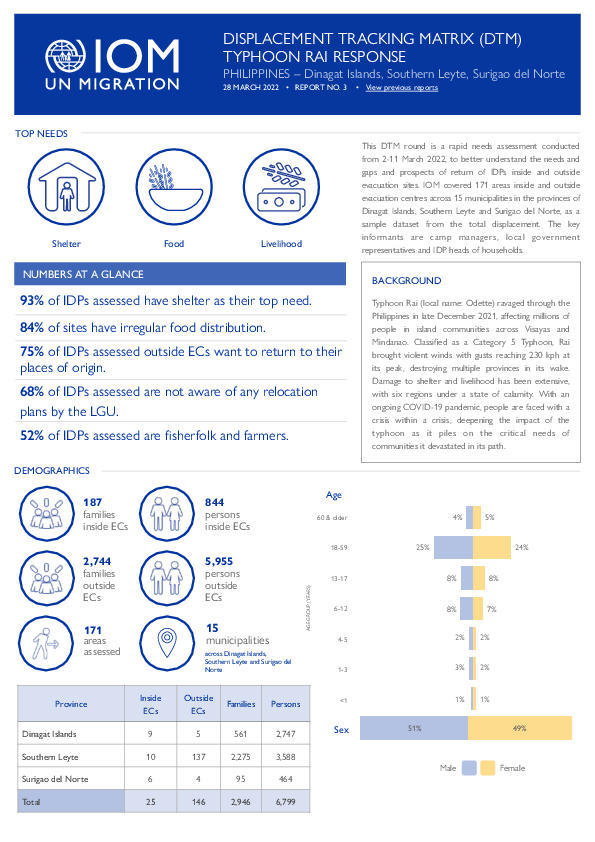-
Countries
-
Data and Analysis
-
Special Focus
-
Crisis Responses

Contact
dtmhaiti@iom.int
Language
French
Location
Haiti
Period Covered
Jul 02 2022
Jul 08 2022
Activity
- Event Tracking
108 nouveaux déplacements et 213 nouvelles arrivées de personnes déplacées internes ont été rapportés pendant la période d’évaluation dans les 195 quartiers évalués. La situation sécuritaire reste toujors tendue, avec 20 quartiers affectés par des violences généralisées et 11 par des violences ciblées. La plupart des déplacements ont eu lieu dans les communes de Delmas (quartier de Caradeux - Terrain Toto) et Pétion-Ville (quartier de Meyotte). Des affrontements significatifs entre gangs rivaux se sont déroulés vendredi 8 juillet dans les quartiers de Brouklin, Boston, Belecou, Projet Drouillard et Bois Neuf a Cité Soleil. Les déplacements causés par ces affrontements seront inclus dans la prochaine mise à jour. Durant la période d’évaluation de 25 juin - 1 juillet, la DTM estimait 447 nouveaux déplacements et 284 nouvelles arrivées de personnes déplacées internes dans 187 quartiers évalués.

Contact
DTM Uganda, dtmuganda@iom.int
Language
English
Location
Uganda
Period Covered
Jun 01 2022
Jun 30 2022
Activity
- Mobility Tracking
There has been a notable reduction in extreme weather events as the MAM rainy season came to an end. Hailstorms/windstorms and fires were the reported hazardous events in June 2022. Across most bimodal areas, the March to May rainy season started late, and cumulative rainfall to date has been significantly below average in the northern and eastern regions and parts of the central region. Given this, first season crop production is expected to be below average at the national level, with northern and eastern areas likely to experience the worst production losses.

Contact
DTMAfghanistan@iom.int
Language
English
Location
Afghanistan
Period Covered
May 07 2022
May 26 2022
Activity
- Survey
To better understand the demographic profiles, living conditions and reintegration processes of Afghan returnees, IOM, under the EU-funded project “Displacement Tracking Matrix Regional Evidence for Migration Analysis and Policy (DTM REMAP)”, developed the Returnee Longitudinal Survey (RLS). This RLS Report provides a snapshot of the of RLS data collection which took place on 7 – 26 May 2022 among Afghan nationals who had returned from Türkiye or the EU between January 2018 and July 2021. A total of 603 returnees (521 from Türkiye and 82 from the EU) were interviewed over the phone across 97 districts in 14 provinces. RLS data collected in May 2022 demonstrates returnees continue to experience significant economic and food-related challenges in Afghanistan.
Contact
DTMUkraine@iom.int
Location
Ukraine
Activity
- Mobility Tracking
- Baseline Assessment
Period Covered
Jun 27 2022 -Jul 08 2022
A baseline assessment is a sub-component of mobility tracking. It aims to collect data on IDP, migrant or returnee population presence in a defined administrative area of the country.
Population Groups
Survey Methodology
Unit of Analysis Or Observation
Type of Survey or Assessment
Keywords
Geographical Scope
Administrative boundaries with available data
The current dataset covers the following administrative boundaries
Contact
DTMUkraine@iom.int
Location
Ukraine
Activity
- Mobility Tracking
- Baseline Assessment
Period Covered
Jun 27 2022 -Jul 08 2022
A baseline assessment is a sub-component of mobility tracking. It aims to collect data on IDP, migrant or returnee population presence in a defined administrative area of the country.
This is a restricted dataset. To get access, kindly click on the 'Request Access' button.
Population Groups
IDPs
Survey Methodology
Unit of Analysis Or Observation
Admin Area 2
Type of Survey or Assessment
Key Informant
Keywords
Geographical Scope Partial Coverage
Administrative boundaries with available data
The current dataset covers the following administrative boundaries

Contact
IOM Philippines, IOMPhilippines@iom.int
Language
English
Location
Philippines
Period Covered
Mar 02 2022
Mar 11 2022
Activity
- Mobility Tracking
Typhoon Rai (local name: Odette) ravaged through the Philippines in late December 2021, a"ecting millions of people in island communities across Visayas and Mindanao. Classi!ed as a Category 5 Typhoon, Rai brought violent winds with gusts reaching 230 kph at its peak, destroying multiple provinces in its wake. Damage to shelter and livelihood has been extensive, with six regions under a state of calamity. With an ongoing COVID-19 pandemic, people are faced with a crisis within a crisis, deepening the impact of the typhoon as it piles on the critical needs of communities it devastated in its path.
To better understand the demographic profiles, living conditions and reintegration processes of returnees, IOM, under the EU-funded project “Displacement Tracking Matrix Regional Evidence for Migration Analysis and Policy (DTM REMAP)”, developed the Returnee Longitudinal Survey (RLS). This report intends to provide summary findings of the first round of RLS data collection that took place in Afghanistan (May to August 2021), Bangladesh (October 2020 to January 2021), Iraq (August to September 2020) and Pakistan (January to April 2021). While the RLS also collects data on the sustainability of reintegration (economic, social and psychosocial), this summary report solely focuses on the analysis and comparison of data collected in the four countries on the profiles of the returnees. The specific thematic areas for analysis under this report include: socio-demographic background, employment status, income status, debt status, migration drivers, return journey and prior migration experience and re-migration intentions.

Contact
DTM Nigeria, AllUsersInDTMNigeria@iom.int
Language
English
Location
Nigeria
Period Covered
Feb 14 2022
Mar 30 2022
Activity
- Mobility Tracking
- Baseline Assessment
This report, which presents the results from Round 41 of Displacement Tracking Matrix (DTM) assessments carried out by the
International Organization for Migration (IOM), aims to improve the understanding of the scope of internal displacement and
return movements in north-east Nigeria. The report covers the period from 14 February to 30 March 2022 and reflects the
trends from the six states in Nigeria’s north-east geopolitical zone. This zone is the most affected by the conflict and consists of
the following states: Adamawa, Bauchi, Borno, Gombe, Taraba and Yobe.
In Round 41, a total of 2,197,824 Internally Displaced Persons (IDPs) were identified in 452,219 households. This signified an
increase of 1 per cent (or 26,172 individuals) compared to Round 40 when 2,171,652 IDPs were recorded (March 2022). When
considering the number of IDP individuals in the past 12 months, the number of IDPs in north-east Nigeria has increased by less
than one per cent or 6,631 individuals.

Contact
DTM Nigeria, AllUsersInDTMNigeria@iom.int
Language
English
Location
Nigeria
Period Covered
Jun 29 2022
Jul 05 2022
Activity
- Mobility Tracking
- Event Tracking
With the onset of the rainy season in Nigeria’s northeastern state of Borno, varying degrees of damages have been reported in camps and camp-like settings. Heavy rainfalls, accompanied by strong winds have caused serious damages to IDP shelters and camp infrastructures.
Between 29 June and 05 July 2022, IOM’s DTM programme carried out assessments to ascertain the level of damage sustained in camps and camp-like settings due to heavy windstorms and rainfall. Overall, 2 collective settlements, 1 host community location and 3 camps in Maiduguri M.C, and Jere LGAs were assessed. The worst-hit of the assessed sites was Faria Gidan Block IDP Camp, a camp in Old Maiduguri ward of Jere LGA, where a heavy rainstorm damaged 64 shelters, affecting an estimated 350 individuals.
In total, 185 shelters were either damaged or flooded by storms, leaving a total of 185 households in immediate need of shelter. There were no casualties reported as a result of the storms.

Contact
DTM Nigeria, AllUsersInDTMNigeria@iom.int
Language
English
Location
Nigeria
Period Covered
Jun 27 2022
Jul 03 2022
Activity
- Mobility Tracking
- Event Tracking
Nigeria's north-central and north-west zones are afflicted with a multi-dimensional crisis rooted in long-standing tensions between ethnic and religious groups and involves attacks by criminal groups and banditry/hirabah (such as kidnapping and grand larceny along major highways). During the past years, the crisis has accelerated because of the intensification of attacks and has resulted in widespread displacement across the region.
Between 27 June and 03 July, armed clashes in Batsari and Kankara LGAs of Katsina State, and heavy rainstorms in Ingawa LGA of Katsina State and Doguwa LGA of Kano State have led to new situations of forced displacement. Following these events, a rapid assessment was conducted by DTM (Displacement Tracking Matrix) field staff to inform the humanitarian community and government partners, and enable targeted response. Flash reports utilise direct observation and a broad network of key informants to gather representative data and collect information on the number, profile and immediate needs of affected populations.
During the assessment period, the DTM identified an estimated 3,460 individuals who were affected by the attacks and 318 individuals by the rainstorms. A total of 3,458 individuals were displaced to neighbouring wards in Kankara and Batsari LGAs of Katsina state as a result of the attacks and rainstorms displaced 96 individuals in Ingawa LGA of Katsina state and 222 individuals in Doguwa LGA of Kano state from their places of residence to neighbouring communities. A total of 32 casualties were reported, including 30 injuries and 2 fatalities.

